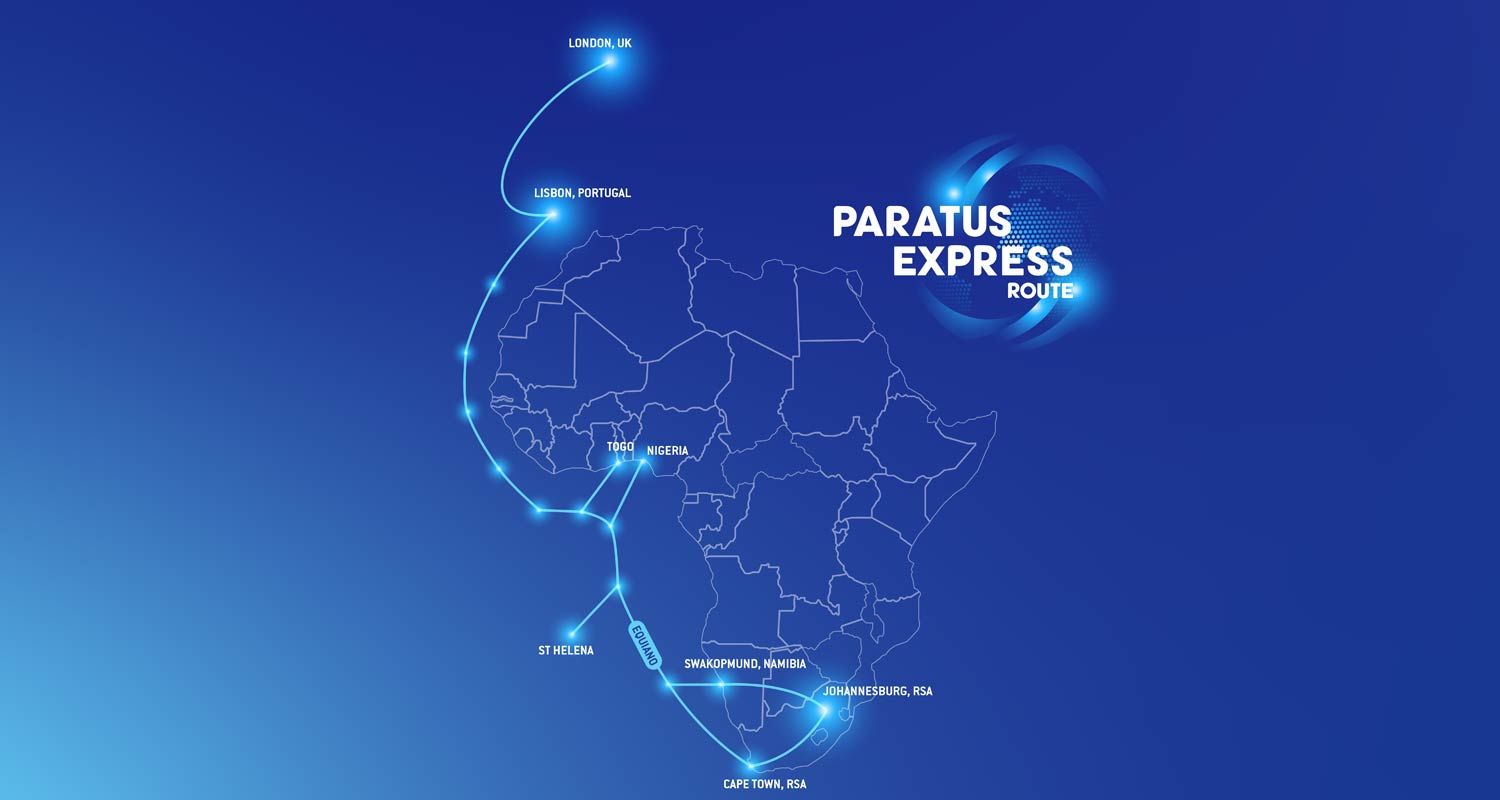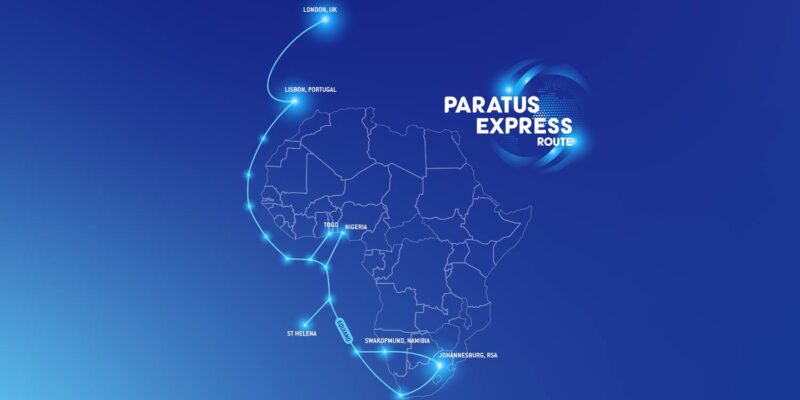
 Paratus Group, a leading pan-African telecommunications provider, recently launched the Paratus Express Route, a ground-breaking fibre route that provides the fastest connectivity between Johannesburg and Europe.
Paratus Group, a leading pan-African telecommunications provider, recently launched the Paratus Express Route, a ground-breaking fibre route that provides the fastest connectivity between Johannesburg and Europe.
This fibre superhighway is the result of a combination of strategic and significant investment by Paratus and the deployment of cutting-edge Infinera technology to create transformed connectivity between Africa and Europe that directly addresses the ever-increasing bandwidth requirements of both telecom providers and enterprises.
Paratus identified that the route was needed to meet the challenge of escalating connectivity demand. Existing infrastructure, such as the West Africa Cable System (Waca), was no longer sufficient to meet the growing demands of businesses and consumers. As global data transmission volumes continue to surge, particularly in the wake of Covid, the need for robust, high-capacity and low-latency connections between Africa and Europe has become critical. In response, Paratus Group invested heavily in creating a contiguous and diverse fibre network by:
- Constructing a state-of-the-art cable landing station (CLS) in Swakopmund, Namibia.
- Developing the 1 890km fibre route from the CLS, traversing Botswana, to the Teraco data centre in Johannesburg.
- Connecting to the Equiano subsea cable to provide a direct route to Lisbon and onward to London and the rest of Europe.
Paratus partnered with Infinera, a pioneer in advanced optical networking solutions, to equip the new Express Route with state-of-the-art technology:
- Infinera GX Series: This platform supports wavelengths of up to 800Gbit/s, providing unprecedented capacity. The GX Series enables Paratus to offer a wide range of services, from 100G to 800G, on a single platform, reducing operational complexity and costs.
- Infinera FlexILS: This flexible intelligent line system enables efficient spectrum utilisation. It allows Paratus to maximise the capacity of its fibre infrastructure, and meet growing bandwidth demands without requiring additional fibre deployment.
- Infinera ICE6 800G solution: Deployed specifically for the Equiano cable system, this solution offers 20 times more capacity than previously available in Namibia. The ICE6 technology provides industry-leading performance, with its unique features like long-codeword probabilistic constellation shaping (LC-PCS) and dynamic bandwidth allocation.
Infinera senior vice president for worldwide sales Nick Walden says: “Infinera is excited to partner with Paratus on this project, leveraging the flexibility and scalability of our platforms and enabling Paratus to offer differentiated high-speed services to meet the growing bandwidth demand in the region.”
In summary, this is what the new Paratus Express Route delivers:
- Increased capacity: The Express Route’s ability to support wavelengths up to 800Gbit/s allows telecoms providers to offer significantly higher bandwidth to their customers, meeting the growing demand for data-intensive applications and services.
- Lower latency: The 123ms latency between Johannesburg and Europe enables new use cases and improves existing applications, particularly for financial services, gaming and real-time collaboration tools. This opens new opportunities for African businesses to compete on a global scale.
- Improved reliability: The diverse routing provided by the Paratus Express Route offers telecoms providers a robust alternative to existing submarine cables, enhancing overall network resilience. This is crucial for maintaining business continuity and ensuring always-on connectivity for critical services.
- Futureproofing: The scalable nature of the Infinera technology allows for easy upgrades to meet future bandwidth demands without requiring significant infrastructure changes. This protects the investments of both Paratus and its customers, ensuring the network can evolve with growing needs.
- Economic growth: The improved connectivity is expected to act as a catalyst for digital transformation across various sectors, driving economic growth in the region. By providing world-class infrastructure, Paratus is enabling African businesses to participate fully in the global digital economy.
For both telecoms providers and enterprises, the key features and benefits of the Paratus Express Route are:
- Unparalleled speed: The Express Route offers the fastest connectivity between Johannesburg and Europe, with a latency of just 123ms.
- Massive capacity increase: The network can support wavelengths of up to 800Gbit/s, providing a significant boost in available bandwidth. This allows Paratus to meet ever-increasing data demands of enterprises and telecom customers.
- Redundancy and resilience: The diverse routing offers an alternative path, mitigating the impact of potential fibre outages between Johannesburg and Cape Town. This ensures business continuity and minimises downtime for critical applications.
- Scalability: The Infinera ICE6 technology allows for flexible scaling to meet future bandwidth demands. Paratus can easily upgrade capacity without requiring significant infrastructure changes, thereby future proofing its network investment.
- Spectral efficiency: The advanced modulation techniques and forward error correction in Infinera’s solutions allow Paratus to transmit more data using less spectrum, maximising the utilisation of their fibre infrastructure.
- Operational simplicity: The integrated nature of Infinera’s solutions reduces the number of network elements required, simplifying network management and reducing operational costs for Paratus.
Commenting on the impact the Express Route has for both telecom providers and enterprises, Paratus Group chief commercial officer Martin Cox says: “The Paratus Express Route represents a quantum leap in connectivity between Africa and Europe. This isn’t just an improvement – it’s a complete transformation of what’s possible in African telecommunications. Telecoms providers can now offer their customers unprecedented bandwidth and reliability. Enterprises can now leverage ultra-low latency connections to power real-time applications, cloud services and data-intensive operations.”
 Paratus Group chief commercial officer Martin Cox
Paratus Group chief commercial officer Martin Cox
The Paratus Express Route, powered by Infinera’s cutting-edge technology, represents a giant leap forward in connectivity between Africa and Europe. By leveraging advanced optical networking solutions and making substantial investments in infrastructure, Paratus has created a “fibre superhighway” that addresses not only the current but also the future needs of telecoms providers and enterprises.
As digital transformation continues to accelerate across Africa, the Express Route is poised to play a crucial role in driving economic growth and fostering innovation in the region. With its unparalleled speed, massive capacity and built-in scalability, the Paratus Express Route is set to redefine what’s possible in African telecoms and digital services.
For more information about how the Paratus Express Route can benefit your organisation, or to discuss customised solutions, please e-mail [email protected].
About Paratus
Paratus is committed to raising the bar for providing quality connectivity in Africa. With an eye on the future, the group is investing in infrastructure and establishing itself as a key player in delivering integrated network services across the continent. Among its many and diverse achievements, the group has invested in and launched the East-to-West Africa fibre route and the express route from Johannesburg to the rest of the world.
The group has operations in 15 African countries and employs approximately 800 people across the group. The business extends further to provide satellite connectivity-focused services in more than 30 African countries. This connects African businesses across the continent and delivers end-to-end service excellence. The group’s footprint extends beyond Africa to international points of presence in Europe, the UK and the SA.
Born and bred in Africa, Paratus is thinking big as it grows its footprint to deliver Africa’s quality network. The group aims to deliver real value and services to communities across Africa, while making a positive contribution to transformation in terms of both the people and the environment.
Don’t miss:











Comments